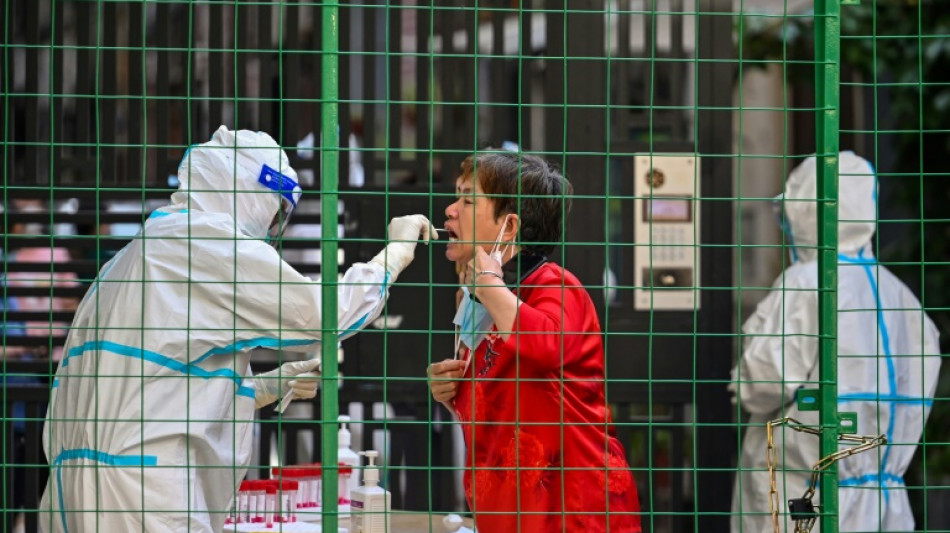
| RBGPF | 100% | 61.84 | $ | |
| CMSC | -0.24% | 24.55 | $ | |
| NGG | 0.4% | 62.37 | $ | |
| GSK | -2.09% | 34.39 | $ | |
| RELX | -0.37% | 45.95 | $ | |
| RIO | -0.31% | 60.43 | $ | |
| SCS | -0.75% | 13.27 | $ | |
| AZN | -0.38% | 65.04 | $ | |
| BCC | -1.57% | 140.35 | $ | |
| JRI | -0.23% | 13.21 | $ | |
| RYCEF | -4.71% | 6.79 | $ | |
| CMSD | -0.02% | 24.725 | $ | |
| BP | 1.65% | 29.05 | $ | |
| VOD | -0.81% | 8.68 | $ | |
| BTI | 0.2% | 35.49 | $ | |
| BCE | -1.38% | 26.84 | $ |
China's Xi backs zero-Covid policy as Shanghai expands mass testing

President Xi Jinping said China must stick "unswervingly" to its zero-Covid strategy, as more than half of Shanghai's 25 million lockdown-weary residents gird Friday for a weekend virus testing drive.
China is the last major economy still pursuing a policy of stamping out all outbreaks, wielding snap lockdowns, mass testing and mandatory quarantines.
But the strategy has come under heightened scrutiny after the fast-spreading Omicron variant triggered sweeping restrictions in major cities such as Shanghai and Beijing, hammering the world's second-biggest economy.
Chinese leaders have attempted to thread the needle between crushing the virus and limiting the damage of lockdowns, with Xi on Thursday calling for "efficiently coordinating Covid-19 prevention and control with economic and social development".
But he said China's "dynamic zero-Covid approach must be unswervingly upheld", according to state news agency Xinhua.
Experts predict that China will struggle to meet its economic growth target of around 5.5 percent this year as virus lockdowns force business shutdowns and snarl supply chains.
The World Bank has sharply slashed its 2022 growth forecast for China to 4.3 percent, warning this week that Covid disruptions could further slow recovery.
- Shifting mosaic of curbs -
The shockwaves from China's Covid lockdowns have hit the global economy as well, especially after the lockdown in Shanghai -- the country's biggest city and a major global shipping hub.
The metropolis said Thursday it would test more than half of its residents for the coronavirus starting Saturday, less than two weeks after it began stumbling out of a gruelling lockdown marked by food shortages and scattered protests.
Shanghai loosened many restrictions last week after finally containing China's worst outbreak in two years, but skittish authorities have continued to impose a shifting mosaic of curbs to guard against a resurgence.
Hundreds of thousands of people are still unable to leave their homes, and a city health official said Thursday that residents in seven districts must get swabbed from Saturday under a drive to "test all who should be tested".
The districts -- including the financial hub of Pudong and several downtown areas -- have a combined population of about 14 million.
In many areas, people will be confined to their homes until all samples are collected.
Parts of Beijing have also reimposed some restrictions after loosening work-from-home orders and allowing restaurants in the capital to reopen for indoor dining earlier this week.
The central district of Dongcheng on Thursday ordered the closure of bars, nightclubs and internet cafes, local media reported, after the capital reported a cluster of infections linked to entertainment venues.
China reported 73 new local infections on Friday, including eight in Beijing and 11 in Shanghai, according to the National Health Commission.
P. O'Kelly--BTZ

 London
London

 Manchester
Manchester
 Glasgow
Glasgow
 Dublin
Dublin
 Belfast
Belfast
 Washington
Washington
 Denver
Denver
 Atlanta
Atlanta
 Dallas
Dallas
 Houston Texas
Houston Texas
 New Orleans
New Orleans
 El Paso
El Paso
 Phoenix
Phoenix
 Los Angeles
Los Angeles



